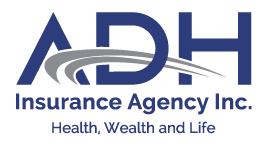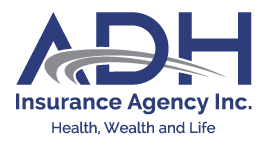Guiding You Through Health Insurance
Insure yourself and your family with health insurance from ADH Insurance Agency, Inc in Elgin, IL. We offer major medical, disability and long-term care insurance policies. If you're not sure what's right for you, we can help. We have more than 45 years of experience helping clients find the right insurance plan. Call (847) 697-0104 for guidance or a FREE quote. If we miss your call, we'll get back to you the next business day.
Navigating You Through the Process
Major Medical
- Let us help you navigate the Affordable Care Act maze.
Critical Illness
Pays cash benefit for onset of cancer heart attack or stroke
Accidental injury policies
Pays cash benefit for unexpected injuries
Long-Term care / Home Health
- Could you afford $6,000 per month in long-term care expenses?
We've got the answers to all your health insurance questions and concerns. Call (847) 697-0104.
FAQs About Health Insurance
I lost my job and my group coverage is ending, what do I do?
If you or anyone in your household lost qualifying health coverage in the past 60 days OR expects to lose coverage in the next 60 days, you may qualify for Special Election Period that allows you to replace your group coverage with an individual policy. You must act within 60 days of the loss of coverage to enroll in a new plan. Call us today, we can help determine the most cost-effective enrollment path for you and your family.construction.
Should I enroll through Healthcare.gov or directly through private insurance companies?
There is no clear-cut answer. We first evaluate coverage through Healthcare.gov to determine if a client qualifies for an Advance Premium Tax Credit. If it is estimated that a client would qualify for an Advance Premium Tax Credit, we enroll through Healthcare.gov so the client can take advantage of the Advance Premium Tax Credit and Cost-Sharing if applicable. If a client estimates that they would NOT qualify for a tax credit, we typically enroll the client directly through private insurance companies.
I am enrolling through Healthcare.gov and I am unsure how to answer the questions asked, what do I do?
Call us today! Our years of experience can help you navigate the sometimes complicated process. Let us guide you with your Healthcare.gov application even if you already started it.
I applied through Healthcare.gov and was told I qualify for Medicaid, but I believe it's incorrect or was denied.
Your answers on Healthcare.gov determine whether or not you apply for Medicaid. Answers to certain questions will trigger Healthcare.gov to pause the application until a coverage determination is made by Medicaid. If Healthcare.gov determines that Medicaid eligibility is likely, we always recommend waiting for Medicaid’s enrollment result; however, there are many cases where a false result is given based on the incorrect answers to a few questions. If you have any questions about your Healthcare.gov result, call us, our experienced agents will be able to determine your correct path to enrollment at the lowest cost possible.
I am currently enrolled in a Major Medical plan through Healthcare.gov, why do I need an agent?
Since 2014, the health insurance market has changed dramatically. Monthly premiums are no longer a good indicator of the coverage level of a major medical plan. In fact, in many cases, there are plans available that may fit a client’s needs better AND cost less than their current plan. We highly recommend discussing your plan options with one of our licensed insurance agents. They do all the research so you don’t have to, saving you valuable time and money.
What is the difference between deductible and out-of-pocket maximum?
A deductible is the amount you pay for covered healthcare costs before your insurance plan starts to pay. With a $1,000 deductible, you pay the first $1,000 of covered services. After you pay your deductible, you usually pay only a copayment or coinsurance for any further covered services. The out-of-pocket maximum is the most you have to pay for covered services in a plan year. After you spend this amount on deductibles, copayments, and coinsurance, your health plan pays 100% of the costs for covered benefits. Generally, plans with higher deductibles have lower monthly premiums. Plans with lower deductibles have higher monthly premiums. The out-of-pocket limit for a major medical plan for 2020 is $8,150 for an individual plan and $16,300 for a family plan. Since 2014, the out-of-pocket maximum has become the MOST IMPORTANT number for a major medical plan. For instance, if you had two options of a $500 deductible plan vs. a $1,500 deductible plan with the same out-of-pocket maximum of $8,150 and a serious medical event occurred. You would be responsible for the same amount of $8,150 of covered charges (assuming the maximum was reached). Furthermore, you would continue to pay the higher premium amount for the lower deductible plan, whereas the client with a $1,500 deductible plan would continue to pay the lower of the two premiums, but paid the same $8,150 for covered services.
What is the difference between an HMO and PPO?
A PPO is a type of health plan where you pay less if you use providers in the plan’s network. You can use doctors, hospitals, and providers outside of the network for a cost typically higher than those in the plan’s network. Typically, you do not need a referral to see a specialist if you have a PPO Plan. An HMO plan is a type of health insurance that usually limits coverage to care from doctors who work for or contract with the HMO. Typically, the plan will not cover out-of-network care except in an emergency. An HMO will require a referral from your primary care provider for other care outside of your primary care provider.
Free Health Insurance Quotes. Call us Today!
Quotes can be provided to you within 24 hours.
(847) 697-0104
Schedule a quick chat with us—personalized insurance, made easy.
We are licensed in over 30 states, Currently we represent 10 organizations which offer 57 products in your area.
You can always contact Medicare.gov, 1-800-MEDICARE, or your local State Health Insurance Program (SHIP) for help with plan choices.

